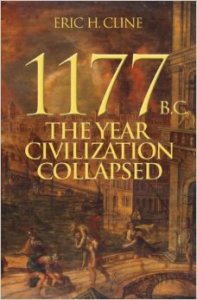Eric Cline’s book, 1177 B.C.: The Year Civilization Collapsed, provides a scholarly summary on the rise and decline of the bronze age in the Mediterranean region. Citing a number of different reasons for collapse, I find the most interesting to be a complex systemic failure arising from a continuous wave of natural disasters combined with external attacks by “sea peoples” which the “global” system could not withstand. These shocks were applied to the ancient system at its peak, in terms of power and interconnectedness, which indicates that collapses seem to occur near peaks, not troughs, in societal wealth and prosperity. And several civilizations tend to disappear at the same time; much as species extinction tends to occur in clusters. Chinese dynasties, Mesopotamian cities, Persian kings, the Mongols, the Romans and countless other examples show the same pattern.
Category: bubble

Sander van der Leeuw, from Arizona State University and the Santa Fe Institute, discusses anthropology and how modern society has much to learn from its own past. Great presentation, I highly recommend.
Fora.tv:
Can the Distant Past Teach Us About Modern Crisis?
Podcast:
Can the Distant Past Teach Us About Modern Crisis?
The importance of the city and its function in society plays an important role in the 21st century. Understanding its development and future will provide key insights to capital flows and societal change. Sander van der Leeuw quickly outlines these details in the follow videos:
There are two sites which deliver similar analysis, when compared to The Bubble Index™, of financial markets and indices.
These two sites are:
And here are two videos associated with these sites:
HED Captial Management Video on Vimeo
Parallax Financial Research Video on Vimeo



